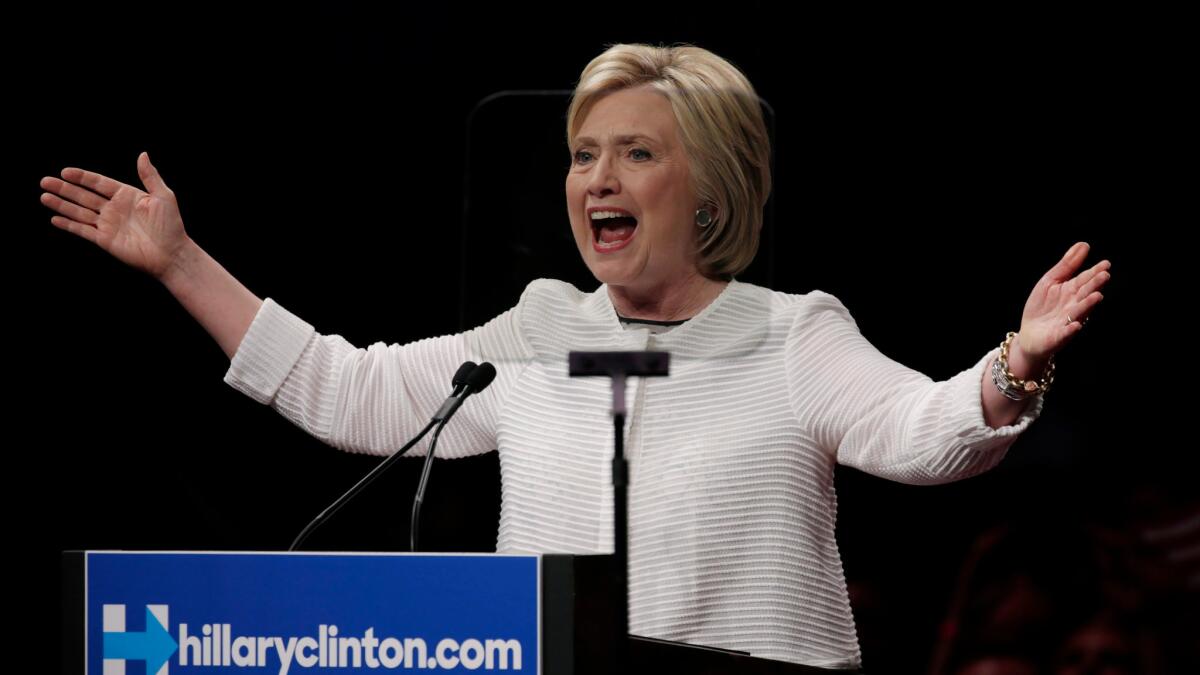Column: Bernie Sanders has been vanquished. Can Hillary Clinton now win over his followers?

As she claimed ownership of the Democratic presidential nomination on Tuesday evening, Hillary Clinton knew she had to appeal to supporters of Bernie Sanders, the insurgent progressive whose campaign attracted millions of young voters.
In her brief, and uncharacteristically lyrical speech, Clinton therefore praised Sanders, who had still shown no sign of conceding that his long-shot effort to claw the nomination from her had failed.
She talked in general terms about principles that Democrats in both bitterly feuding camps presumably believe in: greater economic equality, a higher minimum wage and “getting unaccountable money out of politics.”
“Sen. Sanders, his campaign and the vigorous debate that we’ve had about how to raise income, reduce inequality and increase upward mobility have been very good for the Democratic Party and for America,” she said, waving a giant olive branch at her still-unreconciled rival.
Clinton doesn’t only need to pacify the liberal wing of her party, she needs to find a way to bring skeptical independent and moderate voters to her side.
Clinton also spent considerable time reminding voters of the one factor that she and her campaign may consider their ace in the hole: The presumptive Republican nominee.
“Donald Trump is temperamentally unfit to be president,” she said. Trump’s slogan, “Make America great again,” is “code for let’s take America backward,” she charged.
In any major speech, the things that are left out are often as important as the sentiments that were included. Clinton didn’t mention her husband, former President Bill Clinton, although he was onstage. She didn’t mention President Obama, who named her secretary of state, although she’s counting on him for help in the campaign too.
Perhaps most important, she wasn’t triumphalist. She didn’t mention the raw electoral numbers that her campaign aides have been brandishing, increasingly fiercely, over the past few weeks; the fact that on Monday, the Associated Press declared that she had enough delegates to win the nomination; or that, on Tuesday, she won a majority of “pledged delegates” chosen through primaries and caucuses even before the California results were in; or the fact that she was on track to win some three million more voters than Sanders over the course of an unexpectedly difficult primary campaign.
Nor did she make any demand that Sanders drop out of the race, not even a gentle hint.
It was as if the entire Clinton campaign had suddenly noticed that they had finally crossed the finish line, and could, for once, be generous to their defeated opponent – even though, in private, there is still little or no mutual affection between the two camps.
As recently as Tuesday afternoon, prominent Clinton supporters including Sen. Dianne Feinstein (D-Calif.) were openly expressing annoyance at Sanders’s resistance to dropping out. But other Democratic elders, including President Obama and Vice President Biden, urged Clinton and her aides to give Sanders the space he needed to recognize that his movement was sputtering to an end.
Obama called both candidates on Tuesday. He congratulated Clinton on securing the nomination, and congratulated Sanders on his campaign. Obama will meet with Sanders on Thursday, a White House statement said.
Over the last few weeks, the Sanders team has been slowly coming to terms with the implacable arithmetic of the race: Clinton’s lead – among both “pledged delegates” and unelected superdelegates – was too large to overcome. Still, they’ve said that they need time to reach a consensus that their cause is hopeless – and, as a practical matter, to help their enthusiastic supporters think about transferring their allegiance to the nominee they’ve been fighting.
One test for Clinton, then, was whether she would make that process easier or harder for the Sanders camp – whether she would demand a concession speech, or criticize the senator for hesitating, as some of her aides had already done.
In the end, she chose to be gracious – if mostly by omission.
Plenty of hard work still lies ahead, of course. Sanders and his followers have a list of demands for changes in the party rules and platform that they intend to press at the convention in Philadelphia next month.
And Clinton doesn’t only need to pacify the liberal wing of her party, she needs to find a way to bring skeptical independent and moderate voters to her side as well.
Her most vigorous rhetoric came as she reminded voters that she’s not Donald Trump, whom she said “wants to win by stoking fear and rubbing salt in wounds.”
“We are better than this,” she said. “We won’t let this happen in America.”
From the perspective of history, the most important thing that happened on Tuesday was that a woman claimed the presidential nomination for the first time in American history – and, to be sure, Clinton marked that landmark, too.
But only for a moment.
Underneath the rhetoric, the rest of her speech was brisk, practical and politically targeted – not unlike the candidate herself.
Twitter: @DoyleMcManus
Follow the Opinion section on Twitter @latimesopinion and Facebook
More to Read
A cure for the common opinion
Get thought-provoking perspectives with our weekly newsletter.
You may occasionally receive promotional content from the Los Angeles Times.











